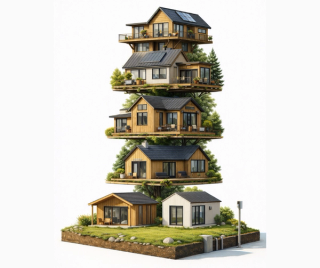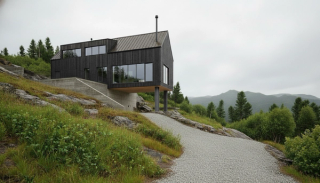How will I pay for this? A quick introduction to construction loan types

Designing and building a house is an exciting venture, and finding the right construction loan to finance it is an important step. There are several types of residential new construction loan products available, each with its own characteristics and requirements.
Let's break them down into simple terms:
Construction-Only Loans: This type of loan covers the construction of your home and must be paid off once the home is completed. It's a short-term loan, usually lasting for a year or less. You would need to apply for a separate mortgage loan to pay off the construction loan once your home is built. The main advantage is flexibility in choosing your permanent mortgage lender, but the downside is having to qualify for, and close on, two separate loans.
Construction-to-Permanent Loans (One-Time Close): This loan combines the construction loan and the traditional mortgage into one loan. It starts as a loan to finance the construction. Once the construction is complete, it converts into a permanent mortgage. This means you only go through the application and closing process once. The benefit here is the convenience of one application and closing process for both phases, potentially saving on closing costs. However, you're locked into the mortgage rate with the same lender.
Renovation Loans: While not strictly for new construction, renovation loans allow you to purchase or refinance a home and make improvements or build new construction on existing property. The loan amount is based on the projected value of the home after improvements are made. This can be a great option if you're buying a fixer-upper or need to add significant improvements to your existing home.
Owner-Builder Loans: These are for individuals who have the qualifications and experience to act as their own general contractor. Lenders see these loans as risky, so they may be harder to come by and could come with higher interest rates or require a larger down payment. This option allows for more direct control over the construction process but demands a significant time commitment and expertise in construction.
Land Loans: If you're looking to purchase a piece of land to build your future home, you might need a land loan before getting a construction loan. These loans are used to finance the land purchase, and then you would transition to a construction loan once ready to build. Land loans can have higher interest rates and require larger down payments compared to traditional mortgages.
Each of these loan types serves different needs and situations. The right one for you will depend on factors like your financial situation, how quickly you plan to pay off the construction costs, whether you already own the land, and your comfort level with managing the construction process. It's also important to shop around and talk to different lenders to find the best terms and rates for your situation.
We’ll be hosting a series of How We Do It Webinars and Home Work Podcasts to further explore the topic of construction financing. We’ll also speak with lending experts on where to secure this financing, how best to prepare yourself to apply, and when in the design and development sequence you should get going. Stay Tuned!


